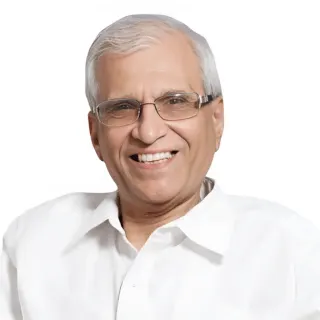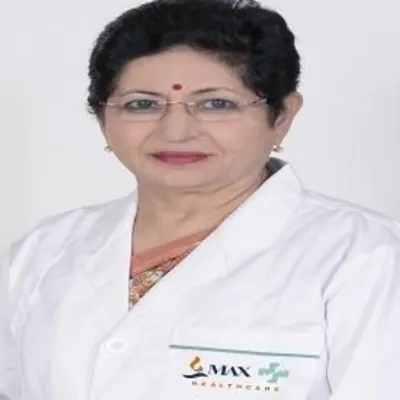Best Kidney Transplant Specialists in Artemis Hospital Gurgaon
 30 December,2025
Read More
30 December,2025
Read More
Enquire now in case of any assistance needed
 30 December,2024
30 December,2024
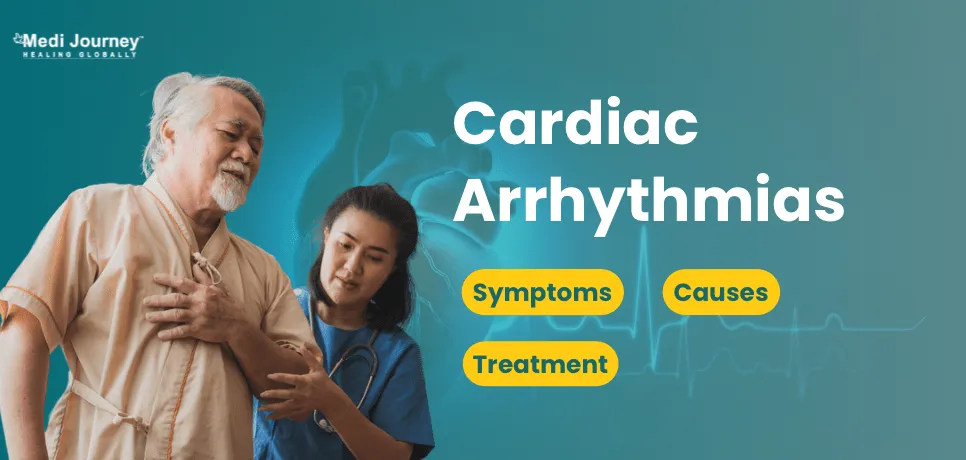
Cases of heart disease are rapidly increasing, especially after COVID-19. While heart attack and coronary artery disease are known to be some of the leading causes of death due to cardiovascular diseases, arrhythmias or irregular heartbeats can't be ignored. With reports suggesting approximately 2 to 5% of the population is affected by arrhythmias, it has now become a growing concern among young people.
Cardiac arrhythmias, or irregular heart rhythms, are a group of conditions in which the heart beats abnormally—too fast or too slow. These variations occur due to disruptions in the heart's electrical signaling system, which controls the timing and pattern of heartbeats. While some arrhythmias are harmless and require no treatment, others can be life-threatening, requiring immediate attention and long-term management.
Understanding the causes, symptoms, and treatment of arrhythmias is necessary for maintaining heart health and preventing complications such as heart failure or stroke. In this article, we have tried to give every detail of arrhythmias in an easy-to-understand manner.
Fill up the form and get assured assitance within 24 hrs!
The heart is a 230-440 gm muscular organ responsible for pumping blood throughout the body. Its rhythm is controlled by electrical signals originating in the sinoatrial (SA) node, the heart's natural pacemaker. These signals travel through the heart, ensuring that it beats in a coordinated manner.
An arrhythmia occurs when these electrical impulses are disrupted due to abnormal signal generation or interference in their conduction pathways. As a result, the heart's rhythm becomes irregular, potentially affecting its ability to pump blood effectively.
While arrhythmias can occur in healthy individuals, they are more common in people with heart diseases or other medical conditions. The severity ranges from mild, asymptomatic cases to severe, life-threatening conditions that can result in sudden cardiac arrest.
Arrhythmias are classified based on the speed of the heartbeat and the area of the heart where they originate. Here's an overview of the major types:
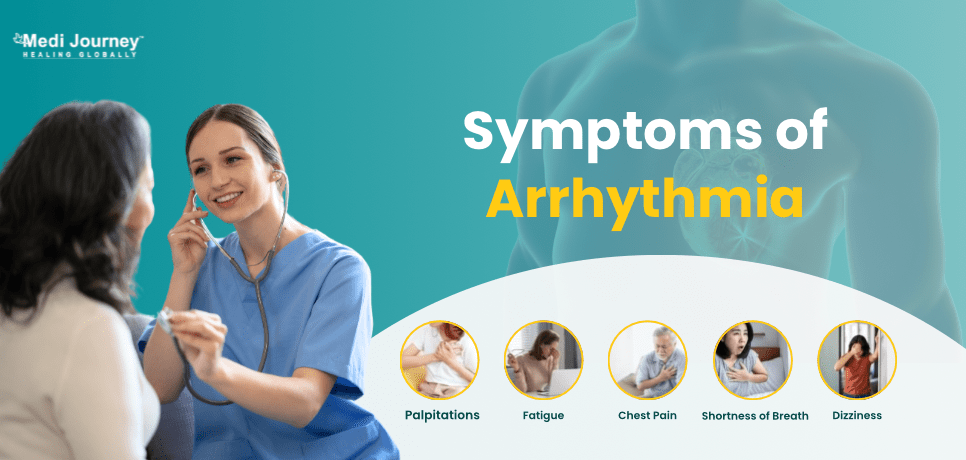
Symptoms of arrhythmias vary widely depending on the type and severity. Some arrhythmias may go unnoticed, while others can cause significant discomfort or life-threatening complications. Common symptoms include:
In some cases, arrhythmias present no symptoms and are only detected during routine medical examinations.
The causes of arrhythmias can be grouped into several categories, ranging from heart-related issues to lifestyle factors:
Certain factors make individuals more susceptible to arrhythmias. These include:
By addressing changeable risk factors such as obesity and lifestyle choices, individuals can lower their chances of developing arrhythmias.
Diagnosing arrhythmias involves evaluating symptoms and medical history and performing certain diagnostic tests. Cardiologists can find irregular heartbeats by listening to your hurt murmurs and calculating heart rhythms. If they suspect arrhythmia, they will order further tests and studies to confirm the diagnosis.
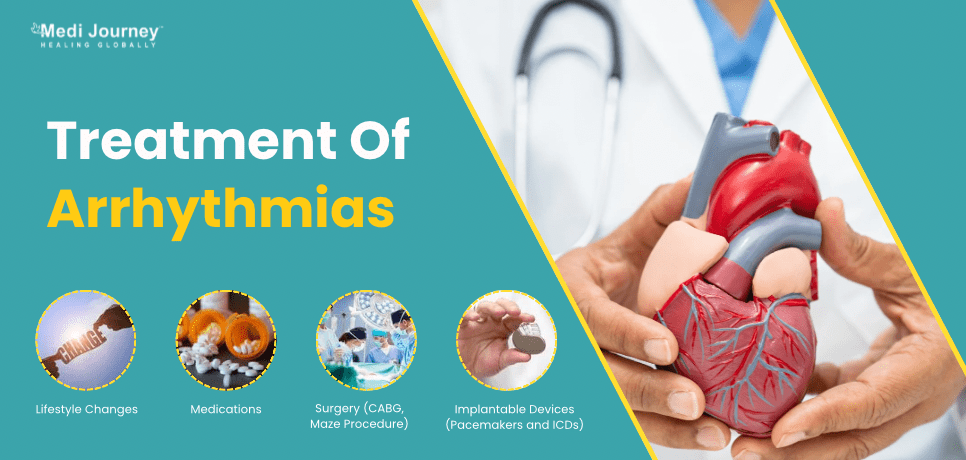
Treatment for arrhythmias depends on their type, severity, and underlying cause. Here are the primary approaches:
Lifestyle choices play an important role in arrhythmias. Making a few lifestyle changes, along with other treatments, can help keep your heart healthy and manage arrhythmias. Things that you can do are:
Medicines are commonly used to manage arrhythmia. The treating physician carefully identifies the type of medication and their doses. Common medications for treating irregular heartbeats include:
Interventional cardiologists may insert certain devices to control the irregular heartbeat. These include:
Surgery may be necessary in certain cases to correct structural abnormalities or remove damaged tissue. Common surgical procedures for treating cardiac arrhythmias include:
Untreated arrhythmias often lead to serious complications, including:
Early intervention can prevent these outcomes and improve quality of life.
Cardiac arrhythmias are common, but understanding their symptoms and treatments can make a significant difference. Whether mild or severe, managing arrhythmias through early detection, medical care, and lifestyle changes can improve outcomes and quality of life. Always consult a doctor if you notice unusual heart-related symptoms; timely intervention is key to preventing complications. Stay proactive about your heart health!
Fill up the form and get assured assitance within 24 hrs!
Doctor of Pharmacy
Dr. Deepanshu Siwach is a skilled clinical pharmacist with a Doctor of Pharmacy degree.?He has 4+?years of experience and has worked with thousands of patients. He has been associated with some of the top hospitals, such as Artemis Gurgaon.
Dr. Aseem Ranjan Srivastava is an experienced Pediatric Cardiothoracic Surgeon specializing in Minimal Access and Robotic Cardiac Surgery. He strongly recommends prompt corrective repair when possible....
Not all arrhythmias are serious. Some, like occasional premature beats, are harmless. Others, like ventricular fibrillation, can be life-threatening if not treated timely.
Certain arrhythmias, like supraventricular tachycardia (SVT), can be cured with procedures such as cardiac ablation. Others, like atrial fibrillation (Afib), may require lifelong management.
People diagnosed with irregular heartbeats can live normal and healthy lives with proper treatment, monitoring, and lifestyle changes.
Dysrhythmia is another term for arrhythmia, referring to any abnormal heart rhythm.
Adopting a healthy lifestyle is necessary to address arrhythmia. This includes exercising regularly, managing stress, and eating a balanced diet. Patients must also avoid stimulants and quit smoking for better heart health.
Senior Consultant
Medical Oncologist
Nanavati Super Specialty Hospital, Mumbai
WhatsApp UsSenior Director
Gynecologist and Obstetrician, IVF Specialist
Max Super Speciality Hospital, Shalimar Bagh, New Delhi
WhatsApp UsSenior Director
Gynecologist and Obstetrician, IVF Specialist
Max Smart Super Speciality Hospital, Saket, New Delhi
WhatsApp UsSenior Director
Gynecologist and Obstetrician
Max Smart Super Speciality Hospital, Saket, New Delhi
WhatsApp UsSenior Director
Gynecologist and Obstetrician
Max Smart Super Speciality Hospital, Saket, New Delhi
WhatsApp UsSenior Director
Gynecologist and Obstetrician
Max Smart Super Speciality Hospital, Saket, New Delhi
WhatsApp UsThe Art of Effective Communication
 30 December,2025
Read More
30 December,2025
Read More
 24 December,2025
Read More
24 December,2025
Read More
 23 December,2025
Read More
23 December,2025
Read More
 17 December,2025
Read More
17 December,2025
Read More
 16 December,2025
Read More
16 December,2025
Read More
 10 December,2025
Read More
10 December,2025
Read More
Trusted by Patients
"I am Asim from Bangladesh and was looking for treatment in India for neuro. I visited many websites to get the complete information regarding the treatment but I was not satisfied as I was getting confused. In the meanwhile, one of my friends suggested I seek help from Medi Journey as he experienced his medical journey very smoothly and was satisfied with it. They have filtered the top 10 doctors as per experience, the success rate of surgery & profile, so it helps us to choose the best treatment in India. "
"For my knee surgery, Medi Journey guided me to BLK Hospital where I received exceptional care. The team's support and the expertise at BLK Hospital exceeded my expectations. Thank you Medi Journey for making my medical journey stress-free. "
"I came from Iraq for my granddaughter's eye surgery in India facilitated by Medi Journey, due to critical cases they advised us to get a second opinion from the different hospitals before going to surgery. Finally, we went to Fortis Escort Hospital, which helped us to get more confidence for diagnosis. Fortis Escort Hospital has the best eye surgeon team with the latest instruments. Thanks to all team members for providing a high-quality treatment in India at an affordable cost. "
"I came for my hair transplant in India, before coming I was so confused about choosing the best clinic and surgeon for me. But thanks to God one of my friends had a hair transplant in India through Medi Journey. He recommended me to go with them. I am completely happy with my experience with them. They were always very fast in their responses to me. the success rate of my hair transplant surgery is 100%."
"Artemis Hospital, suggested by Medi Journey, turned out to be a great choice for my treatment. The personalized assistance and medical care were exceptional. I'm grateful to Medi Journey for guiding me to a hospital that perfectly matched my needs. Highly recommended! "
"I came from Afghanistan for my treatment in India at Jaypee Hospital, Noida. I had a fantastic experience with Medi Journey. Kudos to them for their incredible support during my medical journey. They not only took care of all the logistics but also connected me with a fantastic healthcare team. Efficient, caring, and highly recommended for a hassle-free medical tourism experience."
"I am Adam from Kano, Nigeria, one of my friends from Nigeria was facilitated by Medi Journey, and he recommended us to go with them. I sent my all reports to them and within 48 hours they reverted with 4 options from different hospitals. They helped me to get a Visa letter from the hospital, arrange pick-up from the airport, and book a hotel for me. Their team is very honest and throughout our stay in India they are with us they are caring for us like his family members. BLK Hospital is the best hospital in India with a top surgical oncologist surgeon team, a very advanced OT, and a Radiotherapy department. I wish more success to Medi Journey. "
"Great experience at the Max Hospital for my spine surgery and was successfully done. I thank my neurosurgeon and his entire team. I recommended all of my country's people to Medi Journey for treatment in India, they choose the best hospital, the best doctors, and the best cost for patients."
"I came to India from Dhaka, Bangladesh for my father-in-law's cardiac surgery at Fortis Hospital. I was confused about choosing the best surgeon for him before coming, but their team helped me to choose the best hospital and best cardiac surgeon in India with very good cost and 100% success rate of surgery. I am very happy with the services, really they make my journey so comfortable that make me feel at home. Thanks again and I like people to choose "Medi Journey" as your travel guide. "
"I am Mohammad from Bangladesh came to India for my general health checkup. Medi Journey offers me the complete package including Pick-up from the airport, hotel services, and 24-hour assistance. They guide you to choose the best hospital in India, the best cost of treatment with top-most doctors and give you complete information about hotel booking, and pick-up from the airport before coming to India They have the best team to help. Always choose Medi Journey for your treatment in India."
